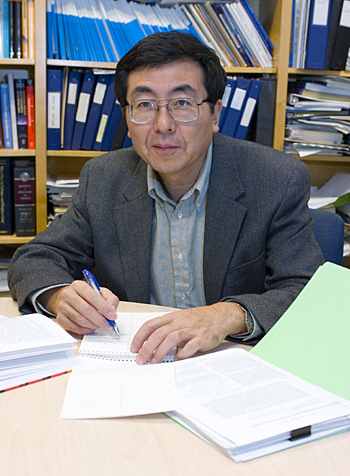
Chen will receive a plaque and a cash gift at the society's awards ceremony on May 21 in Somerset, N.J., where he will also present an Excellence in Catalysis Award lecture.
Chen is being recognized by the society “for his work in understanding the physical and chemical properties of bimetallic and metal carbide surfaces, which has inspired new applications of fundamental studies to catalytic and fuel cell processes.”
Catalysts increase the rate of chemical reactions. Bimetallic catalysts, which are formed by combining atoms of two metals, possess unique physical, chemical and electronic properties unlike those of either parent metal. They are used in numerous applications, including in fuel cells, where they facilitate the reaction of oxygen and hydrogen, to petroleum refining.
Metal carbides, such as tungsten carbide, are characterized by catalytic properties similar to precious metals. They also often demonstrate better resistance to carbon monoxide poisoning, which is a problem that scientists are working to conquer to make fuel cells more efficient and less expensive to produce.
Using combined experimental and theoretical approaches, Chen's group has made pioneering contributions in the understanding and design of bimetallic and carbide catalysts with desirable properties. His group has also advanced an electron spectroscopic technique known as Near-Edge X-ray Absorption Fine Structure (NEXAFS) to elucidate the chemical and physical properties of catalysts and of key reactive species on them. His 1997 monograph on NEXAFS investigations of metal oxides, nitrides, carbides and sulfides, published in Surface Science Reports, remains the seminal study in this area.
Currently, Chen and Brian Willis, UD assistant professor of chemical engineering, are involved in a $4.6 million research project funded by the U.S. Department of Energy to make hydrogen fuel cells less costly to produce and more stable through the use of materials such as tungsten carbide modified with low concentrations of platinum instead of pure platinum. The collaborators include Pacific Northwest National Laboratory, Oak Ridge National Laboratory and Ballard Power Systems, a fuel cell manufacturer. His research efforts are also sponsored by other federal, state and industry funding agencies over a wide range of topics in catalysis and energy.
He also co-founded and is the principal investigator of the Synchrotron Catalysis Consortium at the National Synchrotron Light Source, Brookhaven National Laboratory. The consortium, the first of its kind in the United States, is sponsored by the U.S. Department of Energy to promote synchrotron research by the nation's catalysis community.
Chen received his bachelor's degree from Nanjing University and his doctorate from the University of Pittsburgh. After a year in Germany as a Humboldt postdoctoral fellow, he began his career in industry in 1989 at the Exxon Research and Engineering Co. in Annandale, N.J. He joined the UD faculty in 1998 and served as director of the Center for Catalytic Science and Technology from 2002 through 2007.
Chen has published more than 160 articles in refereed journals, holds 16 U.S. patents, and has served on the editorial boards of several surface science and catalysis journals. He also serves on the board of directors of the North American Catalysis Society and formerly was the catalysis secretary-general of the American Chemical Society.
Article by Tracey Bryant

